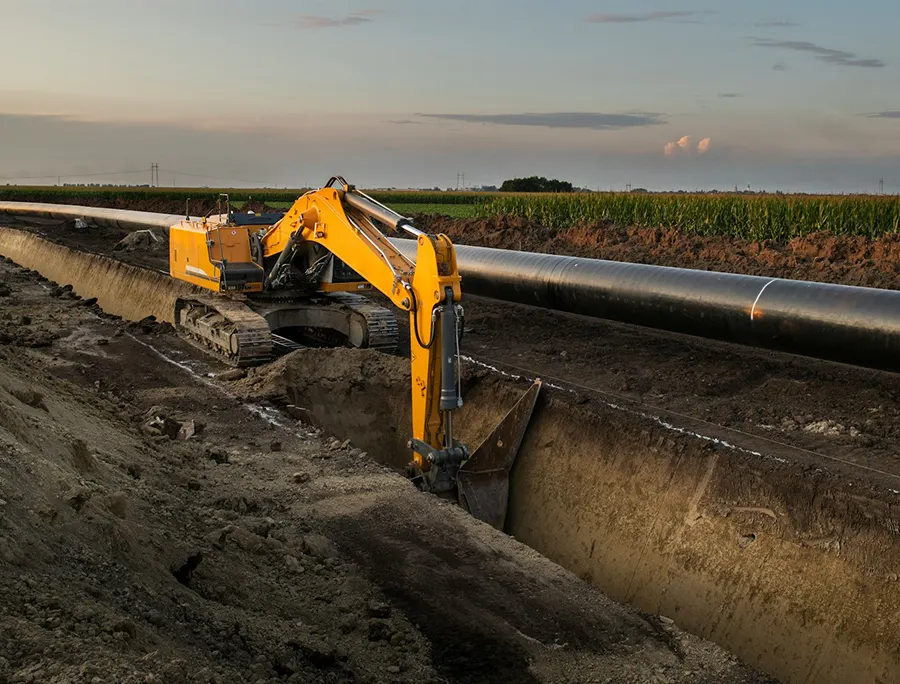Understand your right to compensation
after a serious injury or fatality while
working with an excavator in Charlotte
Excavators are the workhorses of construction sites in North Carolina, but their immense power can come with serious risks. If you operate or work around excavators, it’s vital to understand their potential dangers. From rollovers and cave-ins to struck-by accidents and electrocution, even a minor mistake can have devastating consequences.
The good news?
In North Carolina, workers’ compensation provides benefits for eligible workers who suffer injuries while operating or working near excavators. This article will explore some common dangers associated with excavators and explain how to seek compensation if an accident occurs.
What is the most common danger in excavating?
According to the Centers for Disease Control and Prevention (CDC), struck-by incidents, largely involving excavators, are among the leading causes of death and the primary cause of nonfatal injuries in the construction industry since 1992.
This is due to the dangers associated with excavator quick couplers, which are used to switch out excavator attachments swiftly. When these couplers fail, they can cause heavy attachments like buckets to fall, leading to death or catastrophic injuries like traumatic brain injuries, permanent spinal cord damage, broken bones, and organ damage.
Other common dangers of working with excavators include:
- Trench collapses and cave-ins, which can occur when the walls of an excavation site are not properly secured, trapping workers beneath several tons of soil.
- Overturning of the excavator due to operating on uneven terrain or improper handling, which can crush operators or nearby workers.
- Electrocution, particularly when the excavator accidentally contacts overhead power lines or underground utilities.
- Drowning, occurring when working near or in water-filled trenches and the excavation site becomes unstable or fills rapidly.
- Noise and vibration exposure, leading to long-term hearing loss and vibration white finger, among other repetitive stress injuries.
Workers and employers must be vigilant in maintaining strict safety protocols, such as using proper trenching supports, ensuring clear communication among crew members, and conducting regular equipment checks, to mitigate these risks. Additionally, workers should receive thorough training on excavator operation and safety procedures to prevent these types of accidents and injuries.
Lack of Training:
The Deadly Reality for
North Carolina Workers
Understand your rights after a work injury caused by inadequate training.
Are excavation accidents covered by workers’ comp in NC?
Yes, excavation accidents are generally covered by workers’ compensation in North Carolina.
In North Carolina, workers’ compensation is a no-fault system designed to provide benefits to employees who are injured or who develop an occupational disease as a result of their employment. This includes injuries that occur during excavation work, such as cave-ins, falls, equipment accidents, or other related incidents.
Most employers in North Carolina with 3 or more employees are required by law to have workers’ compensation insurance, although some workers, including certain farmworkers, sawmill workers, loggers, and independent contractors, do not qualify.
North Carolina construction worker dies in trench collapse
In July 2022, Joshua Kerry Brindle, a construction worker in Albemarle, North Carolina, died in a trench collapse while working on a housing development. Despite efforts by the Concord Urban Search and Rescue Team’s Trench Rescue Unit, Brindle died before rescuers could reach him. The exact cause of the collapse is under investigation, with OSHA involved to determine the details.
This tragic event underscores the risks construction workers face when working with and around excavators and highlights the importance of workers’ compensation benefits for family members of victims who tragically lose their lives in these types of work-related accidents.
How does workers’ compensation work in North Carolina?
Workers’ compensation in North Carolina operates under a no-fault system designed to provide benefits to employees who suffer work-related injuries or occupational diseases, regardless of who was at fault for the accident.
This means that employees do not need to prove that their employer was negligent to receive benefits. However, for an injury or medical condition to be covered under workers’ compensation, an employee must be able to prove that it’s directly related to their job and that it occurred in the course of their employment.
To receive these benefits, injured workers also need to take certain steps, including informing their employer of the injury within 30 days and submitting the necessary paperwork, known as Form 18, to the North Carolina Industrial Commission to start their claim.
If the claim is approved, workers could receive various benefits, including:
- Medical benefits. This includes coverage of all necessary medical treatments related to the work injury.
- Wage replacement benefits. This is compensation for lost wages if a worker is unable to work due to their injury. This typically amounts to about two-thirds of their average weekly wage.
- Vocational rehabilitation benefits. These benefits provide assistance with reeducation and vocational training if a worker is unable to return to their previous job but is still capable of working in some capacity.
- Permanent disability benefits. If the injury results in a permanent disability, workers may be entitled to permanent total disability (PTD) benefits or permanent partial disability (PPD) benefits, based on the severity and nature of the impairment.
- Death benefits. If the injury results in a worker’s death, their dependents are entitled to benefits for funeral expenses and lost income.
What is Form 18 in NC workers’ compensation?
Form 18 is an official document that an injured employee must fill out and submit to the North Carolina Industrial Commission (NCIC) to initiate a claim for workers’ compensation benefits. This form serves as the formal notice of the accident to the employer for the purpose of obtaining workers’ compensation benefits.
Form 18 includes sections for personal information, details about the employment and the employer, a description of the accident and injury, the medical treatment received, and your work status following the injury.
Completing and submitting this form is a critical step in the claims process, as it officially notifies the NCIC and the employer about the work-related injury or illness and starts the timeline for processing the workers’ compensation claim.
While you have up to 2 years to file a claim for workers’ compensation in North Carolina, it’s best to do so as soon as possible after your injury to ensure any necessary documentation and evidence is readily available.
Do I need an attorney to help with a workers’ comp claim after an excavation accident?
Probably. Due to the severity of the injuries associated with excavation accidents, workers are highly encouraged to seek the advice of an experienced workers’ compensation attorney before accepting a settlement.
A skilled attorney can help navigate the often complex workers’ compensation system, ensuring that you understand your rights and the full extent of benefits you’re entitled to receive.
They can also assist with gathering necessary evidence, filling out paperwork correctly to avoid costly mistakes, negotiating with insurance companies, and representing you in any hearings or appeals, if necessary.
Especially in cases involving severe injuries where long-term or permanent disability might be involved, having legal representation can make a significant difference in the outcome of your claim, ensuring you’ll have the compensation you need to provide financial security for you and your family well into the future.
Injured in an excavation accident in Charlotte? Wilder Pantazis Law Group can help!
If you or a loved one has suffered a serious injury or fatality in North Carolina after an accident with an excavator, don’t settle for less than you deserve. The experienced Charlotte work injury attorneys at Wilder Pantazis Law Group are here to provide knowledgeable legal support and personalized guidance throughout the workers’ compensation claim process.
Interested in learning more?
We offer free consultations, so you have nothing to lose and everything to gain. Get started by scheduling your complementary case evaluation today.
References
Preventing Struck-by Fatalities Related to Excavator Quick Couplers, Buckets, and Attachments | Blogs | CDC. https://blogs.cdc.gov/niosh-science-blog/2022/03/10/stuck-by-injuries/


